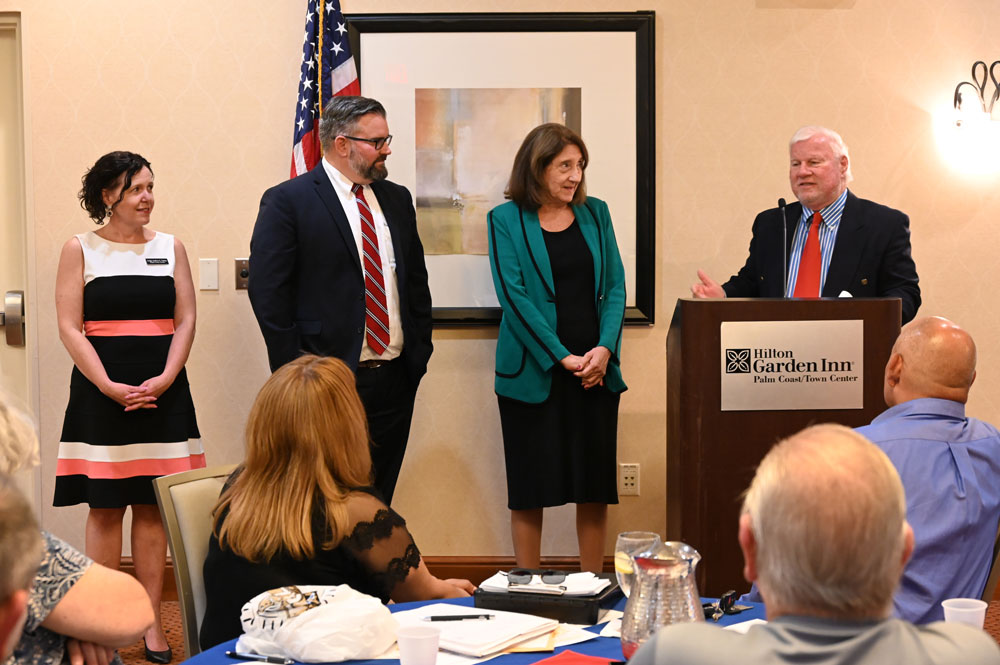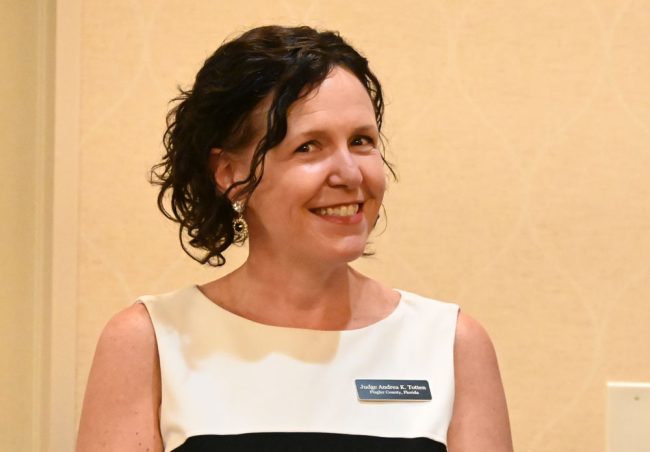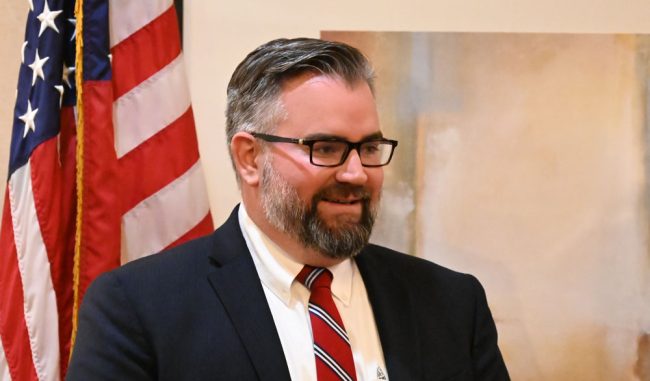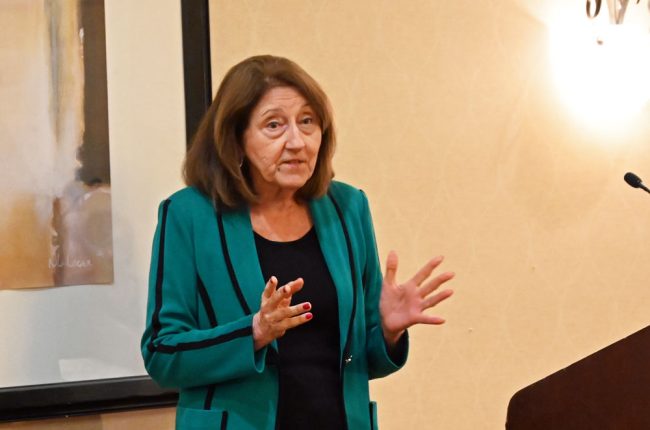
(© FlaglerLive)
A forum of candidates for the judicial branch organized by the Flagler County Republican Club Wednesday evening in Palm Coast was not so much a forum in the customary sense of local elections: there was no campaign literature, no campaign tables, not even searching or analytical questions.
Rather, it was a chance for the three incumbents–Flagler County Judge Andrea Totten, Circuit Judges Kenny Janesk, who sits in Volusia and Putnam, and Stacia Warren, who sits in Volusia–to speak about themselves without the strictures of their robes and in unusually personal terms, but within the bounds of Canon 7. That’s the unique ethical rules judicial candidates must respect when running for a judgeship, and that–unfortunately–apply only to judicial candidates.
Judicial candidates aren’t barred from answering questions or campaigning. But the tenor of their campaigns is distinctly more circumspect and non-partisan than that of any other races. Some judges learn it the hard way, and find themselves booted off the bench for flouting the code, as Scott DuPont did. The Supreme Court ordered him removed from Flagler’s and Putnam’s bench in 2018, for inappropriate behavior during his campaign and on the bench.
The Republican Club forum is the first of two organized by former Clerk of Court and Club leader Gail Wadsworth, along with Ed Fuller, with four more judicial candidates slated for a May forum. All the candidates are from the Seventh Judicial Circuit, which includes Flagler, St. Johns, Putnam and Volusia. Only one–Totten–is running from Flagler. But while the judges are assigned roles and courthouses, their roles and location may change at any time during their tenure. Potentially, any of the candidates (or, in fact, sitting judges) in the circuit could end up in Flagler, making those races local regardless.
But what, is the one person in public office, “you really know the least amount? Would it be fair to say a judge?” Fuller asked the assembly of 40-some people. “Would it be fair to say a judge? So we’re going to accomplish two things here tonight. You’re going to meet them tonight. And they’re going to explain to you a little bit about their bio, and what they do and what they preside over. And also we’re going to have some definitions.”
Each judge was given a few minutes to speak, without taking questions, then Fuller asked them to define a few legal terms. There were no questions about judicial philosophy, workloads, challenges, changes in the conduct of proceedings since Covid, and the like, even though those questions would have been fair game–and Flagler, even within the Seventh Judicial Circuit, has the most developed and accessible video-remote system of the four counties. But judges reveal themselves just as much by the way they speak even about themselves and by what they choose to talk about: Totten came across as the most serious and earnest of the three, Janesk as the folksiest, Warren, unsurprisingly, as the most seasoned, given her family’s storied place in the law in the circuit and her own long tenure on the bench–more than two decades as a county judge, and a circuit judge since 2016.
Warren was the only one of the trio who’d won election to the bench. Totten and Janesk are both DeSantis appointees, making this their first election. Totten was appointed to what was then a newly created county judgeship, the second for Flagler. None of the three are facing a challenger so far, which may explain the added degree of informality Wednesday: the candidates spoke more like they would on Oprah than on 60 Minutes.

Totten was first up, suggesting to the public that the easiest way to get to know a judge is either to come to court or to log on to zoom “judge me judging others from the comfort of your homes.” She summarized her work history, which was shaped mostly by criminal cases, the State Attorney’s Office and the Attorney General’s office. Her work now is a mixture of county civil, from small claims to homeowner insurance to evictions, and some misdemeanor criminal cases (when County Judge Melissa Distler’s docket overflows), traffic cases, probate, and so on. She also sits on the county canvassing board, assuming she does not get an opponent in this year’s race (in which case Distler will fill the role).
“I always strive to be the most prepared person in the room,” Totten said, putting words to what would become obvious to anyone who watches her on the bench even a short time: “When I walk in with two attorneys who have done nothing but personal injury protection litigation all day, every day, for 20 years, and I’ve been doing it for two months, I don’t want them to know that. I’m going to know just as much as they do when I walk in for that type of hearing. There’s been times I’ve spent six hours preparing for a 15 minute hearing.” Think Rick Hoffman’s Louis Litt on “Suits,” but not nearly as obnoxious (or insecure).
She spoke of the patience necessary with people who represent themselves and don’t know procedures, which is often the case in county court or in first-appearance hearings. “Most people are surprisingly nice. I think you wouldn’t be shocked if you watched day after day of first appearances just how polite the inmates are at least to the judge,” Totten said, referring to the first time a person booked at the jail appears before judge, as required by law, within 24 hours of the booking (usually less). “Maybe they weren’t as much so the night before.” There was laughter from a crowd generally more inclined to slam prison doors than want them opened. “I’m not there to pass moral judgment,” Totten continued. “I’m there to pass legal judgment. And so patience and empathy for all of these people in these variety of situations, who see their case and their situation as the most important thing in their life, I need to reflect that back on them: that I hear you, and it’s the most important thing in my life for these 15 minutes that we’re together, too.” (“It is with the ‘unfortunate,’ above all, that humane conduct is necessary,” Dostoevsky had written of prisoners, having been one himself, and considering the treatment of prisoners uniquely reflective of a society’s morals.)
Totten credited the “pieces of advice and wisdom” to colleagues as she became a judge, certainly reflecting the same emphasis on equal dignity Circuit Judge Terence Perkins, who sees the more violent and depraved cases of felony court, affords every defendant, regardless of the case.

Janesk began first by insisting that he be referred to as “Kenny,” perhaps a melancholy note for a first name that for most judges quickly gets replaced by “Judge.” He spoke of the importance of the judiciary, even though most people wouldn’t be able to name their judges–“more important than sometimes it’s realized.” Sooner or later, he said, people’s fates intersect with the judiciary for one reason or another. He spoke of his law school days in Jacksonville, getting an internship at the State Attorney’s office in Palatka, then as an assistant state attorney there, starting in misdemeanors and moving on to felony cases and career criminals, the so-called “worst of the worst.”
He also handled crimes against children. “That was some of the most rewarding work I’ll ever do. Why?” Janesk said, borrowing a thought from Gandhi. “Because society is going to be weighed by the way we treat animals, elderly and children. And it was an honor for me to be able to serve in that capacity and truly get justice for those children.” (It was a curious contrast with Totten’s emphasis on speaking with inmates, though of course Janesk at that point was not speaking of his role as a judge, but as a prosecutor. Speaking as a judge, he emphasized the importance of the people’s access to the courts and judges’ duty to “follow the law.”) He also managed that division of the State Attorney’s office. He described his appointment to the bench–his “dream job”–as the second-best thing that happened to him, after the birth of his now-18-month-old daughter. “My wife did call me on my way here just so I could hear the screaming,” he said. “She didn’t want me to be left out.”
Warren first credited the clerks of court who really teach a lawyer how the law actually works beyond law school, then reminded the audience: “Unlike my two colleagues over here, they were appointed. Me over here, I had to go the hard way by getting elected, and I was elected in 1990,” the judge said. “Thank goodness because having an opponent is rough. And hopefully I won’t have one.” She described herself as “a milkman’s daughter,” a parent who had a 10th grade education who put her on track to go to college and be a teacher, since that was one of only three other jobs open to women at the time. Secretary and nurse were the others. She had other ideas. She wanted to be Perry Mason. She did teach for a few years, traveled the world–Australia, the Middle East–then opted for law school, became a lawyer, and moved to Florida, starting at the State Attorney’s Office.

She married the celebrated Dan Warren, who as State Attorney in the 1960s had crushed the KKK in St. Augustine, and practiced law with him when he was a defense lawyer. “So here I was a prosecutor and he was a defense lawyer, right?” she recalled. “So he’d come home every night and say, Oh, I’m going to take this case, this lady burned her kids and and they claimed she burned her children in the trailer. And I go, I was at first appearance today, she’s as guilty as they come. You should have seen her face. You’re going to represent her? I want a divorce.”
The crowd laughed. “Anyhow, that was our life, but it was wonderful because our children are lawyers. We got one doctor, one CPA. I mean, it’s great conversation. We’d be having Thanksgiving dinner, and what do you do? We’ll talk about the law. So when the food is cold, I have been asked to get up and go look up the law, come back to the table and explain to all of us why he’s right. When I became the judge though, I overruled him.”
She retired after 22 years, found out she had no life, and ran again to be a circuit judge, now serving in family court, a particularly challenging assignment (she’d handled injunctions all day). “It was a really bad day, but it’s over and tomorrow will be a better day, right? But you teach,” Warren said. “It’s like, I feel like I’m still a teacher, even though I am not. I feel like I still teach from the bench, and I try to explain to the people why I did what I did.” She summed up: “I’m just Stacia.”
Fuller then had the judges define a few legal terms (the latin for when a case won’t be prosecuted, and so on), but nothing Wadsworth couldn’t have answered in her sleep. The hour quickly came to its end, and Fuller had promised the judges, who can be as severe with the clock as they are with sloppy lawyers, not to go past 7 p.m. The hour over, the judges quickly left, and the meeting took on its more political-club dimensions. (Several candidates for other races were there, soliciting petitions to enable them to get on the ballot without paying a fee.)
Judicial candidates are constrained in their electoral activities because rules are guided by the principle that the judicial branch, which has no enforcers, depend on judges to uphold the public trust and confidence in the branch. (President Andrew Jackson famously underscored the courts’ ultimate impotence when he defied a Supreme Court decision with these words about the Chief Justice: “Well, John Marshall has made his decision, now let him enforce it.”) That trust could be easily damaged by the vagaries of partisan electioneering.
So unlike candidates for more pedestrian offices, judges may not accept endorsements from political parties (endorsements from individuals who are not running for office are OK, and endorsements from media are not in the Canon’s purview), discuss their views even on disputed political issues, add lawyers who may appear before them as “friends” on their social media or professional pages, or even personally solicit money for their campaign: not even their website is allowed to have campaign-contribution buttons. They may not invite people to their fundraising events or receive contributions, except through a committee (just as a committee may raise funds on behalf of the candidate: Totten’s website, for example, is run by her committee).
Curiously, however, lawyers are free to contribute money to the campaign (through that committee), and won’t require the judge’s recusal should that lawyer appear before them on a case. But if a local sheriff, state attorney or lawyers are supporting a judge’s campaign in any way, the judge is require to disclose that in open court, for the record.
Should they draw opposition, the judges would be on the primary election ballot leading up to Election Day on Aug. 22. If two candidates are running in any given race, the primary will decide the winner. If more than two are running and no candidate wins more than 50 percent of the vote, then the two top vote-getters will go on to a run-off in the Nov. 8 election. Judicial candidates have a different qualifying date: the qualification ends at noon on April 29. Other candidates’ qualifying window closes on June 17 at noon. Election details are at the Supervisor of Elections’ website.






























Paul Cook says
I just had my day in court, or should I say, on my computer via Zoom. (Lemon Law)
My case went on for 5 years. (2016 to 2021)
I found out after the case my Attorney could not post an objection to the many lies made by the Attorney
for FORD Motor Co.
I tried to contact the Judge to tell and show proof of my concerns.
All I want is the TRUTH to be known. I have gotten no where. The Judge refused to read my letters.
I need help.!!!!
I am a 100% disabled Viet Nam Vet. I find it very hard to believe that an Attorney can get away with
lying to a Judge in a court.